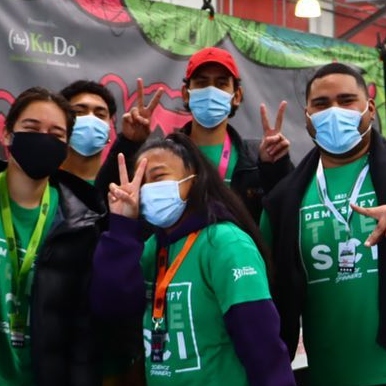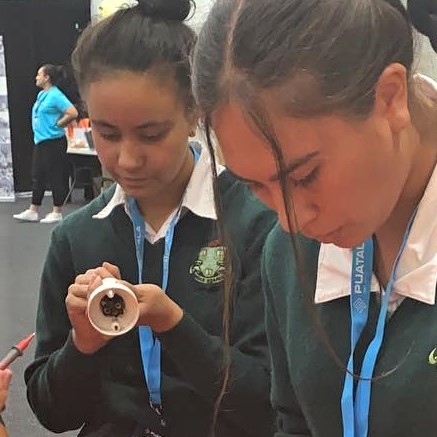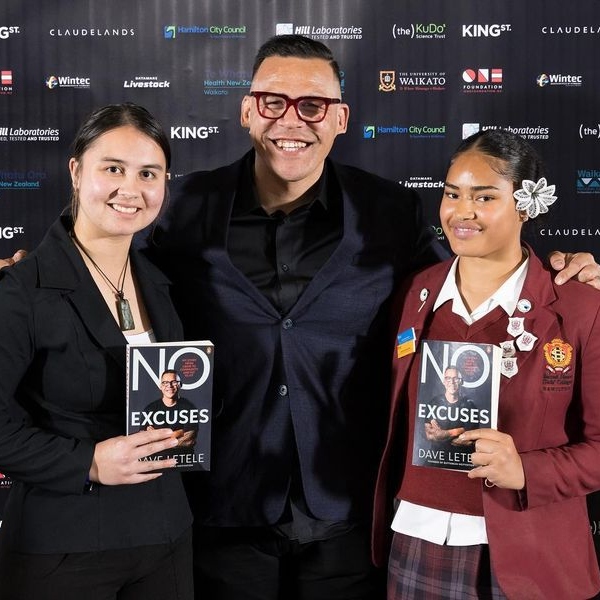There are very few Māori and Pasifika graduates in STEM subjects; for example, Māori and Pasifika each make up 6.7% of STEM graduates from the University of Auckland. So Māori and Pasifika scientists are thin on the ground. In English-medium schools, Māori and Pasifika students often struggle to engage with Science, and don’t see a place for themselves in the subject. NZASE Science Communicator Mike Stone describes how the Kudos Trust aims to change that.
Waikato is a centre for science research and innovation, especially in environmental and agricultural sciences – at one time a quarter of NZ’s science research was done in this region. Hamilton’s mayor set up the Hamilton Science Awards Trust to acknowledge science achievements in the Waikato.
In 2015 they received an MBIE Unlocking Curious Minds grant to kickstart their new Science Spinners programme, aiming to engage Māori, Pasifika and vulnerable students in science and STEM.
“Growing up, I attended decile 1 schools, attended mainly by Māori and Pasifika students. Science was generally a boring subject, with a lot of talking and big words. Thinking back on that experience, and with little change in achievement rates today for our Pasifika youth, I wished Science could be more hands-on, practical and relevant. This is where Science Spinners was born.” Science Spinners CEO Soteria Ieremia
Science Spinners
This outreach and education arm of the Kudos Trust runs events to encourage engagement of Māori and Pasifika students in low-decile schools. These days have been designed with three aims; to:
- Ignite interest in STEM/science, build problem-solving skills and develop critical thinking, using real-life contexts.
- Build aspirations of higher academic achievement.
- Showcase science pathways and careers to build better futures.
Each school is allocated places for 12 students and a teacher. They are asked to select Māori and Pasifika students, including those with little science interest. The trust meets the $180 cost/student, including transport and relief, to remove barriers to participation. There are now six separate events held in South Auckland and Waikato. Each day they host about 140 students, mixing them so each group includes students from different schools. They rotate through 12-15 activities covering five different areas of science:
- Primary industries; horticulture, agriculture and food technology
- Environmental science and climate change
- Sport and health science
- Engineering – computing, electrical, civil, biomedical
- Digital technology.
There is also a cultural component to the day, guided by local iwi and Pasifika leaders. Science Spinners engages students in hands on activities and real-world problems, using CRI scientists and industry experts across STEM fields. The Kudos Trust values the input of Māori and Pasifika scientists, who are important role models for these students. Surveys of these students before and after their day with Science Spinners found that:
- 55 percent of Waikato students said they were interested in science when they arrived, and 95 percent when they left (33% to 89% for Auckland students).
- Many said meeting new friends and learning together was an important part of the day.
Of the 2016/17 Science Spinner cohort, 62 percent went on to STEM learning or jobs.


Image: Kudos

STEM Hub
This programme was developed to help Y 11-13 students discover that a career in science/STEM
does not have to start by going to university. As well as technology institutes, there are many organisations in agriculture, engineering, health, environment and digital technologies that are keen to recruit school leavers, sometimes with internships and cadetships. So this programme helps respond to the need for a skilled workforce across STEM careers.
Creative Lab
This programme has been developed for Yrs 9-10 students. It aims to answer some of their burning questions through participatory learning, problem solving and stories. Soteria says the fast-paced and fun environment fires their imagination and ignites a curiosity beyond the traditional classroom setting.” In Years 9-10, students choose their senior subjects and “often students do not realise how important these subject choices are,” she says. Many Māori and Pasifika students do not choose science subjects because they do not see science as an option for their future. Science Spinners wants to open the eyes of these students to their own abilities, so they realise science could be a path for them.
Ngā Kupu
Āhuarangi hurihuri
Climate change
Ahumahi mātāmua
Primary industry
Hangarau
Technology
Hangarau kai
Food technology
Hangarau matihiko
Digital technology
Mātai ahuwhenua
Agricultural science
Mātai hākinakina
Sport science
Mātai hauora
Health science
Pūhanga hiko
Electrical engineering
Pūkaha
Engineering
Pūtaiao ā-nuku
Earth science
Resources
See Kudos events on our website.
Visit Science Spinners website, Facebook, Twitter and Instagram.

